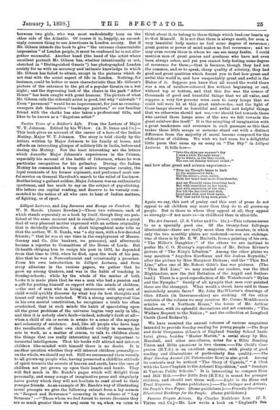Lilliput Lectures, and Lay Sermons and Essays on Conduct. By
W. B. Rands. (James Bowden.)—These two volumes, each of which stands separately as a book by itself, though they are pub- lished at the same moment and in similar format, contain a great ideal of very pleasant matter expressed with an artless originality that is decidedly attractive. A short biographical note tells us that the author, W. B. Rands, was "a shy man, with a few devoted friends ; " that he was at one time in the employment of Messrs. Gurney and Co. (the bankers, we presume), and afterwards became a reporter to Committees of the House of Lords. But 111-health obliging him to resign his post in 1875, he depended from that time to 1882, when he died, upon the work of his pen. Also that he was a Nonconformist and occasionally a preacher. From his own introduction to Lifliput Lectures, and from stray allusions in the various papers, we gather that he grew up among Quakers, and was in the habit of teaching in Sunday-schools; while by the whole of the matter of both books it is made plain that he was a man who had a passion and a gift for putting himself en rapport with the minds of children. —the sort of man who in living intercourse with any sort of child would quickly discover by what key its best thoughts and truest self might be unlocked. With a strong metaphysical bias in his own mental constitution, he recognises a truth too often overlooked, that in such minds the habit of speculating upon all the great problems of the universe begins very early in life ; and that it is nobody else's fault—indeed, nobody's fault at all— when a child of six or seven is awake to a sense of the mystery and solemnity of existence. And, like all people who have kept the recollection of their own childhood vividly in memory, he sets to work, as a matter of course, to talk to children about the things that are really interesting and really important to immortal intelligences. That his books will attract and interest children like-minded with himself there is no doubt. It is another question whether they will interest children generally,— on the whole, we should say not. Still we recommend them warmly to all grown-up people who, having preserved a childlike attitude of spirit towards the secrets of heaven and earth, have the care of children not yet grown up upon their hearts and hands. They will find much in Mr. Rands's pages which will delight them personally, and many scraps of imaginative prose and singularly naive poetry which they will not hesitate to read aloud to their younger friends. As an example of Mr. Randa's way of illustrating moral precepts we give the following extract from a lay sermon on "Respect and Reverence" occurring in the volume of "Lay Sermons" :—" Those whom we feel forced to revere (because they are so much greater than we are) seem to us, when we come to think about it, to belong to those things which lead our hearts up to God Himself. It is not that there is always merit, for even a very beautiful body makes us feel some degree of reverence ; great genius or power of mind makes us feel reverence; and we may even revere those in whom we can see many faults. I could mention men of great genius and goodness who have not even been always sober, and yet you cannot help feeling some degree of reverence for them ;—that is because, though they had not the common, and so to speak, cheap quality of sobriety, they had good and great qualities which forced you to feel how great and awful this world is, and how unspeakably great and awful is the Maker of it. Suppose you knew that all round the world there was a sea of rainbow-coloured fire without beginning or end, without top or bottom, and that this fire was the source of thousands of good and beautiful things that we all value, and suppose a very few persons were seen to carry lamps that we could tell were lit at this great rainbow-fire, and the light of these lamps showed us beautiful and awful and helpful things that we otherwise should not see,—we should feel towards those who carried these lamps some of the awe we felt towards the great rainbow-fire itself." It is the mingling of imagination with a great tenderness and reverence in such passages as this that makes these little essays or sermons stand out with a distinct difference from the majority of moral lessons composed for the edification of children. We wish we had room for a delightful little poem that sums up an essay on "The Sky" in Lilliput Lectures. It tells how— "Into the skies one summer's day
I sent a little Thought away ; Up to where, in the blue round, The sun sat shining without sound ;"
and how after great and solemn experience— "Then my Thought began to hark
In the illuminated dark, Till the silence, over, under.
Made her heart beat more than thunder, And my Thought came trembling back But with something on her track, And with something at her side; Nor till she has lived and died, Lived and died, and lived again, Will that awful thing seem plain.*
Again we say, this sort of poetry and this sort of prose do not appeal to all children any more than they do to all grown-up people. But to those to whom they appeal at all, they appeal as strongly—if not more so—in childhood than in after-life.










































 Previous page
Previous page